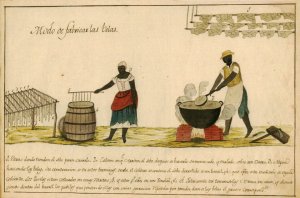Presented By: Department of History
CANCELLED: “Suing for an Enslaved Woman’s Child in the Nineteenth-Century Río de la Plata”
Magdalena Candioti, with a commentary by Ángela Pérez Villa

Please join us for a lunchtime discussion of the pre-circulated paper:
“Suing for an Enslaved Woman’s Child in the Nineteenth-Century Río de la Plata”
This article traces the history of Petrona, an enslaved woman sold in Santa Fe (Argentina), sent to Buenos Aires and later possibly to Montevideo (Uruguay). Her case demonstrates how the legal status of enslaved persons was affected by the redefinitions of jurisdictions and by the forced or voluntary crossings between political units. It sheds light on the circulation and uses of the Free Womb law (1813) in Argentina and Uruguay and traces legal experts’ debates over its meaning. And it reveals the knowledge enslaved people had of those abolitionist norms and how they used them to resist forced relocations, attempt favorable migrations, or achieve full freedom. The article reflects on the impact of independence on enslaved persons’ lives, the gendered bias of the abolitionist process, and the
central yet untold uses of antislavery rhetoric in the national narratives.
The article will be circulated in advance of the event; please contact Elizabeth Collins (elizabac@umich.edu) to obtain a copy.
Magdalena Candioti is Associate Researcher of the National Council for Scientific and Technological Research (CONICET) at the Instituto de Historia Argentina y Americana “Dr Emilio Ravignani” and Associate Professor in the Department of Humanities and Sciences, Universidad Nacional del Litoral, Argentina. Candioti’s doctoral research focused on the political history of justice in the nineteenth-century Río de la Plata, resulting in the book Un maldito derecho: leyes, jueces y derecho en la Buenos Aires republicana, 1810–1830 (Buenos Aires, Didot). She is currently working on a book on gradual abolition in the Río de la Plata (1810-1860) called El tiempo de los libertos. Esclavitud y abolición en el Río de la Plata. Candioti was a visiting fellow in ILAS-Columbia University, NYC (2010-2011), and Postdoctoral Fellow at the Max Planck Institute for European Legal History (MPIeR), Frankfurt, Germany (2014). In 2014, she was awarded a scholarship by the Slicher van Bath DeJong Foundation, CEDLA (Holland) to conduct comparative research on slavery in Santa Fe and Buenos Aires. Currently, she is a Fulbright fellow at the Afro-Latin American Research Institute at Harvard University.
Ángela Pérez-Villa is an Assistant Professor of History and Gender and Women’s Studies at Western Michigan University. Her research and teaching focus on the social, legal, and gender history of Latin America, particularly Colombia. Currently, she is working on a book manuscript that examines how during Colombia’s war of independence, political power and legal practice were disputed and reconfigured locally on the terrains of family, sexuality, and gender.
Sponsored by the U-M Department of History, the Center for Latin American and Caribbean Studies, and the Law in Slavery and Freedom Project.
“Suing for an Enslaved Woman’s Child in the Nineteenth-Century Río de la Plata”
This article traces the history of Petrona, an enslaved woman sold in Santa Fe (Argentina), sent to Buenos Aires and later possibly to Montevideo (Uruguay). Her case demonstrates how the legal status of enslaved persons was affected by the redefinitions of jurisdictions and by the forced or voluntary crossings between political units. It sheds light on the circulation and uses of the Free Womb law (1813) in Argentina and Uruguay and traces legal experts’ debates over its meaning. And it reveals the knowledge enslaved people had of those abolitionist norms and how they used them to resist forced relocations, attempt favorable migrations, or achieve full freedom. The article reflects on the impact of independence on enslaved persons’ lives, the gendered bias of the abolitionist process, and the
central yet untold uses of antislavery rhetoric in the national narratives.
The article will be circulated in advance of the event; please contact Elizabeth Collins (elizabac@umich.edu) to obtain a copy.
Magdalena Candioti is Associate Researcher of the National Council for Scientific and Technological Research (CONICET) at the Instituto de Historia Argentina y Americana “Dr Emilio Ravignani” and Associate Professor in the Department of Humanities and Sciences, Universidad Nacional del Litoral, Argentina. Candioti’s doctoral research focused on the political history of justice in the nineteenth-century Río de la Plata, resulting in the book Un maldito derecho: leyes, jueces y derecho en la Buenos Aires republicana, 1810–1830 (Buenos Aires, Didot). She is currently working on a book on gradual abolition in the Río de la Plata (1810-1860) called El tiempo de los libertos. Esclavitud y abolición en el Río de la Plata. Candioti was a visiting fellow in ILAS-Columbia University, NYC (2010-2011), and Postdoctoral Fellow at the Max Planck Institute for European Legal History (MPIeR), Frankfurt, Germany (2014). In 2014, she was awarded a scholarship by the Slicher van Bath DeJong Foundation, CEDLA (Holland) to conduct comparative research on slavery in Santa Fe and Buenos Aires. Currently, she is a Fulbright fellow at the Afro-Latin American Research Institute at Harvard University.
Ángela Pérez-Villa is an Assistant Professor of History and Gender and Women’s Studies at Western Michigan University. Her research and teaching focus on the social, legal, and gender history of Latin America, particularly Colombia. Currently, she is working on a book manuscript that examines how during Colombia’s war of independence, political power and legal practice were disputed and reconfigured locally on the terrains of family, sexuality, and gender.
Sponsored by the U-M Department of History, the Center for Latin American and Caribbean Studies, and the Law in Slavery and Freedom Project.